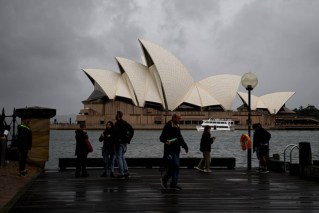A new draft COP26 agreement has watered down the language around phasing out coal and fossil fuels as negotiations at the global climate summit extended past the finish time.
In the final hours of talks, nations at most risk of climate change, such as Tuvalu, were making last-ditch pleas to world leaders and described their homelands as “literally sinking”.
“This is not fiction, not something projected to happen in the future,” said Tuvalu’s climate minister Seve Paeniu, describing his country as disappearing.
Negotiators from 200 countries have been working on a final agreement as the summit prepares to wrap up on Saturday (Australian time).
The latest wording encourages nations to reach higher to tackle global warming but also tries to balance the demands of developing and richer nations with weaker language on phasing out subsidies for fossil fuels.
The current version has been changed to include the word “unabated” before coal, and the phase-out of “inefficient” subsidies for fossil fuels.
Unabated coal generation is where there is no technology in place to remove resulting carbon dioxide emissions.

A member from Tuvalu makes an emotional plea on the final day of COP26 in Glasgow.
The paragraph now reads: “(COP26) calls upon Parties to accelerate the development, deployment and dissemination of technologies and the adoption of policies for the transition towards low-emission energy systems, including by rapidly scaling up clean power generation and accelerating the phase-out of unabated coal power and of inefficient subsidies for fossil fuels.”
Arab nations, many of which are big producers of oil and gas, had objected to the wording in the earlier draft.
COP26 set out with a core aim: to keep alive the 2015 Paris Agreement’s aspirational target to cap global warming at 1.5 degrees Celsius above pre-industrial levels, and so avoid the worst impacts of climate change.
Droughts, storms, floods and fires
Under current national pledges to cut emissions this decade, researchers say the world’s temperature would soar far beyond that limit, unleashing catastrophic sea level rises, droughts, storms, floods and wildfires.
While there is little hope that new promises to bridge that gap will appear in the final day of talks, negotiators are attempting to set new requirements to raise pledges in future, hopefully fast enough to keep the 1.5C goal within reach.
The new draft is a balancing act — trying to take in the demands of both climate-vulnerable nations and large economies reliant on fossil fuels.
The retention of a pledge for countries to upgrade their climate targets in 2022 will be welcomed by poorer nations that want more action to tackle worsening floods and wildfires and rising sea levels.
But it was couched in softer language than a previous text and failed to offer the rolling annual review that some developing countries have pushed for, but Washington in particular opposed.
Countries are currently required to revisit — and preferably raise — their pledges every five years.
The document does still spell out that the world needs to cut greenhouse gas emissions by 45 per cent from 2010 levels by 2030 and to net zero by 2050 to cap global warming at 1.5C, setting the benchmark that future climate pledges will be measured against.
After nearly two weeks of talks, the almost 200 countries represented at COP26 also remain at odds on a range of other issues.
Questions of finance loom large, with developing countries pushing for tougher rules to ensure that rich countries, whose historical emissions are largely responsible for heating up the planet, offer more cash to help the poorest adapt to climate impacts.
So far, rich countries have failed to meet the goal of $US100 billion ($1.36 billion) a year in climate finance that they set in 2009.
Ministers are also attempting to finish the contentious rules that will put the Paris agreement into practice, requiring agreement on long-standing disputes over carbon markets and transparency.
A final deal will require the unanimous consent of the nearly 200 countries that signed the Paris Agreement.
-with AAP









